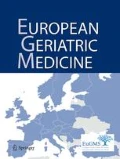Abstract
Purpose The purpose of the study was to explore methods and routines used by older adults to remember to take medications.
Methods
The study was conducted using face-to-face interviews with a convenient sample of older people, who take at least one medication for the treatment of a chronic condition. Interviews were recorded and transcribed verbatim. Thematic analysis was used to analyse the collected data.
Results
Participants (10 men and 28 women, mean age: 79.5) described the methods that aid them in remembering to take their medications. The study identified three content categories: incorporation of medication habits into daily schedule and routine, use of medication aids; and assistance and support from family.
Conclusion
Older people have less difficulty taking their medication regularly if it becomes another habit as part of a daily routine. Health-care professionals should promote various methods to support medication management.
References
Beard JR, Officer A, de Carvalho IA, Sadana R, Pot AM, Michel JP, Lloyd-Sherlock P, Epping-Jordan JE, Peeters GMEEG, Mahanani WR, Thiyagarajan JA, Chatterji S (2016) The World report on ageing and health: a policy framework for healthy ageing. Lancet 387(10033):2145–2154. https://doi.org/10.1016/s0140-6736(15)00516-4 (Epub 2015 Oct 29)
Notenboom K, Beers E, van Riet-Nales DA, Egberts TC, Leufkens HG, Jansen PA, Bouvy ML (2014) Practical problems with medication use that older people experience: a qualitative study. J Am Geriatr Soc 62(12):2339–2344. https://doi.org/10.1111/jgs.13126
van Riet-Nales DA, Hussain N, Sundberg KA, Eggenschwyler D, Ferris C, Robert JL, Cerreta F (2016) Regulatory incentives to ensure better medicines for older people: from ICH E7 to the EMA reflection paper on quality aspects. Int J Pharm 512(2):343–351. https://doi.org/10.1016/j.ijpharm.2016.05.001 (Epub 2016 May 2)
Clyne W, Mshelia C, McLachlan S, Jones P, de Geest S, Ruppar T, Siebens K, Dobbels F, Kardas P (2016) A multinational cross-sectional survey of the management of patient medication adherence by European healthcare professionals. BMJ Open 6(2):e009610. https://doi.org/10.1136/bmjopen-2015-009610
Marcum ZA, Hanlon JT, Murray MD (2017) Improving medication adherence and health outcomes in older adults: an evidence-based review of randomized controlled trials. Drugs Aging 34(3):191–201. https://doi.org/10.1007/s40266-016-0433-7
Schulman-Green D, Jaser SS, Park C, Whittemore R (2016) A metasynthesis of factors affecting self-management of chronic illness. J Adv Nurs 72(7):1469–1489. https://doi.org/10.1111/jan.12902 (Epub 2016 Jan 19)
Atreja A, Bellam N, Levy SR (2005) Strategies to enhance patient adherence: making it simple. MedGenMed. 7(1):4
Vrijens B, De Geest S, Hughes DA, Przemyslaw K, Demonceau J, Ruppar T, Dobbels F, Fargher E, Morrison V, Lewek P, Matyjaszczyk M, Mshelia C, Clyne W, Aronson JK, Urquhart J, ABC Project Team (2012) A new taxonomy for describing and defining adherence to medications. Br J Clin Pharmacol 73(5):691–705. https://doi.org/10.1111/j.1365-2125.2012.04167.x
Liamputtong P (2009) Qualitative data analysis: conceptual and practical considerations. Health Promot J Austr 20:133–139
Sanders MJ, Van Oss T (2013) Using daily routines to promote medication adherence in older adults. Am J Occup Ther 67(1):91–99. https://doi.org/10.5014/ajot.2013.005033
Mahtani KR, Heneghan CJ, Glasziou PP et al (2011) Reminder packaging for improving adherence to self-administered long-term medications. Cochrane Database Syst Rev 9:CD005025. https://doi.org/10.1002/14651858.cd005025.pub3
Scheibe M, Reichelt J, Bellmann M, Kirch W (2015) Acceptance factors of mobile apps for diabetes by patients aged 50 or older: a qualitative study. Med 2 0 4(1):e1. https://doi.org/10.2196/med20.3912
Grindrod KA, Li M, Gates A (2014) Evaluating user perceptions of mobile medication management applications with older adults: a usability study. JMIR Mhealth Uhealth. 2(1):e11. https://doi.org/10.2196/mhealth.3048
Author information
Authors and Affiliations
Corresponding author
Ethics declarations
Conflict of interest
The authors declare that there is no conflict of interest regarding the publication of this article.
Ethical approval
All procedures performed in studies involving human participants were in accordance with the ethical standards of the institutional and/or national research committee and with the 1964 Helsinki declaration and its later amendments or comparable ethical standards.
Informed consent
Informed consent was obtained from all individual participants included in the study.
Additional information
Publisher's Note
Springer Nature remains neutral with regard to jurisdictional claims in published maps and institutional affiliations.
Rights and permissions
About this article
Cite this article
Dworakowska, A.M., Aniszewska, A. & Kozłowska-Wojciechowska, M. Older adults’ strategies to prevent episodic medication non-adherence: results from a qualitative study. Eur Geriatr Med 10, 327–330 (2019). https://doi.org/10.1007/s41999-018-00156-y
Received:
Accepted:
Published:
Issue Date:
DOI: https://doi.org/10.1007/s41999-018-00156-y

